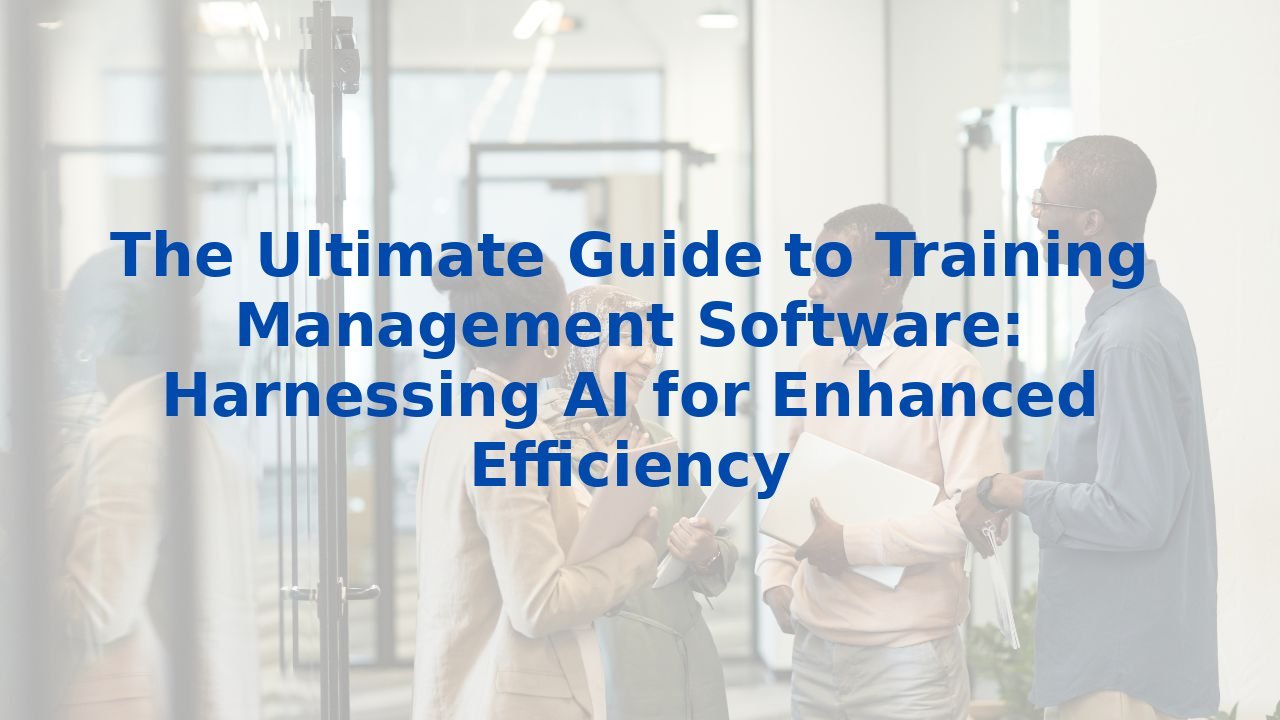The Ultimate Guide to Training Management Software: Harnessing AI for Enhanced Efficiency
The Ultimate Guide to Training Management Software: Harnessing AI for Enhanced Efficiency
Introduction
The way we approach training within organizations is on the verge of transformation. As companies strive to enhance employee skills and performance, training management software emerges as a vital tool. The powerful blend of technology and pedagogy is not merely an enhancement; it's a revolution in efficiency. At the center of this revolution is artificial intelligence (AI), poised to redefine how businesses train their workforce. Let’s explore the trends in this space and how AI is unlocking newfound possibilities.
The Rise of Digital Learning Solutions
The landscape of training management software is undergoing an undeniable shift. The demand for digital learning solutions has skyrocketed, particularly in the wake of the recent global scenario that pushed organizations toward online learning methodologies. As corporations move away from traditional methods, training management software offers scalable and accessible platforms to deliver educational content. The trend is fueled by the need for flexibility and engaging learning experiences in our fast-paced world.
AI Integration: A Game-Changer
One of the flagship advancements within training management software is the integration of AI. This isn't merely about adding a technical layer; it's a complete overhaul of how training is conceptualized. AI enables personalized learning paths and automates many of the administrative tasks that plague traditional training methods.
Personalized Learning Experiences
Imagine a training environment where each employee receives recommendations based on their past performance and preferred learning styles. This is what AI accomplishes. By analyzing data, AI can curate personalized learning experiences that resonate with each individual. As a result, engagement and retention surge, leading to a more effective training regimen.
Automating Administrative Tasks
In an ideal organization, trainers and administrators should spend their time cultivating talent and developing strategies rather than drowning in scheduling and reporting tasks. AI automates these functions, allowing a focus on strategic development. This efficiency not only streamlines operations but also fosters a culture of continuous improvement.
Strategic Benefits of AI in Training Management
Beyond the operational advantages, AI in training management software presents profound strategic benefits:
1. Enhanced Efficiency: With AI, trainers can utilize advanced features to maximize their effectiveness in developing talent.
2. Data-Driven Decision Making: AI analytics provide insights that empower employees to make informed decisions about training and development initiatives.
3. Increased Productivity: AI allows employees to devote their energies to higher-value activities rather than redundant tasks.
4. Rapid Adaptation: As technology evolves, employees skilled in AI tools can pivot more quickly, ensuring the organization remains agile.
Embracing AI Training for Employees
To truly harness the capabilities of AI in training management, organizations must invest in training their employees on utilizing these new tools effectively. When employees are well-versed in AI technology, the impacts are multidimensional:
Enhanced Efficiency: Understanding AI features maximizes the potential of training management software.
Improved Decision-Making: Data analytics lead to wiser choices in developing training programs.
Increased Productivity: Automation frees up time for employees to engage in meaningful work.
Better Adaptation: Familiarity with new technology ensures that employees are not left behind as trends evolve.
Navigating Challenges in AI Integration
While the benefits are clear, it doesn’t come without challenges. A significant obstacle is the cost associated with implementing advanced training management solutions, which can be a barrier for smaller enterprises. Furthermore, transitioning from traditional methods to AI-driven systems can stir adaptability issues within staff. It’s crucial to approach this transition with a strategic mindset, recognizing that the journey will yield rich rewards.
Conclusion
The marriage of AI technology with training management software is transformative for organizational learning. By cultivating personalized experiences, automating mundane tasks, and providing actionable insights, AI accelerates the pathway toward efficiency and effectiveness in training programs. The future will favor organizations that invest in both technology and talent development. To forge ahead in this digital age, embrace the potential of AI—not just as a tool but as a catalyst for growth and innovation. Consider exploring comprehensive training programs to equip your entire workforce with the necessary AI skills and watch your organization thrive in a competitive landscape.
To start this journey, look no further than advanced training solutions that provide structured pathways for learning and skill development. Embrace AI. Unlock potential.



